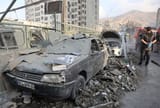Anonymous
ID: +vg758Mb
6/13/2025, 10:59:15 AM No.507197638
IRAN, “STRATEGICALLY” ISOLATED
Israel's attack on Iran exploited a favorable geopolitical moment for Tel Aviv, marked by Tehran’s isolation and Russia and China’s reluctance to offer military support. Trump and Netanyahu no longer waited for Putin’s promised intervention in the American-Iranian negotiations — or perhaps they had already received clear signals about the futility of such an intervention.
With limited retaliatory means, Iran now faces difficulties in responding effectively. Tehran's vulnerabilities have offered Israel the ideal strategic window.
“The Zionist regime should expect a harsh response,” declared Supreme Leader Ali Khamenei. This aggressive rhetoric, which we have grown accustomed to over recent years, seems to be nothing more than a message addressed to extremely angry Iranian citizens — an attempt to calm tensions (half-jokingly, some Iranians do not rule out that Ali Khamenei may be a Mossad agent). Practically speaking, options for retaliation against Israel and the United States are very limited.
The most painful measure would be to disrupt the Strait of Hormuz, through which one-third of the world's exported oil flows (approximately 20 million barrels per day). Anti-ship missile attacks, kamikaze drones (Shahed), or sea mines could drive oil prices up to over $100–150 per barrel. The impact would hurt Western economies, especially Europe, already vulnerable in terms of energy. However, such a strategy would also severely harm Iran itself, which exports 1.5 million barrels daily through Hormuz (mainly to China), representing a vital source of revenue for a country under very harsh sanctions.
A U.S. military response, with the Fifth Fleet stationed in Bahrain, would expose Iran’s oil infrastructure to massive destruction, while China, heavily dependent on Gulf oil, would have no veto power.
Israel's attack on Iran exploited a favorable geopolitical moment for Tel Aviv, marked by Tehran’s isolation and Russia and China’s reluctance to offer military support. Trump and Netanyahu no longer waited for Putin’s promised intervention in the American-Iranian negotiations — or perhaps they had already received clear signals about the futility of such an intervention.
With limited retaliatory means, Iran now faces difficulties in responding effectively. Tehran's vulnerabilities have offered Israel the ideal strategic window.
“The Zionist regime should expect a harsh response,” declared Supreme Leader Ali Khamenei. This aggressive rhetoric, which we have grown accustomed to over recent years, seems to be nothing more than a message addressed to extremely angry Iranian citizens — an attempt to calm tensions (half-jokingly, some Iranians do not rule out that Ali Khamenei may be a Mossad agent). Practically speaking, options for retaliation against Israel and the United States are very limited.
The most painful measure would be to disrupt the Strait of Hormuz, through which one-third of the world's exported oil flows (approximately 20 million barrels per day). Anti-ship missile attacks, kamikaze drones (Shahed), or sea mines could drive oil prices up to over $100–150 per barrel. The impact would hurt Western economies, especially Europe, already vulnerable in terms of energy. However, such a strategy would also severely harm Iran itself, which exports 1.5 million barrels daily through Hormuz (mainly to China), representing a vital source of revenue for a country under very harsh sanctions.
A U.S. military response, with the Fifth Fleet stationed in Bahrain, would expose Iran’s oil infrastructure to massive destruction, while China, heavily dependent on Gulf oil, would have no veto power.
Replies:

